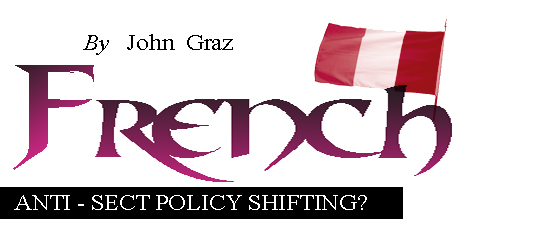French - Anti-Sect Policy Shifting?
John Graz January/February 2003
Getting your Trinity Audio player ready...

By John Graz
France has been the leader of a very restrictive policy against sects and cults for several years. One man has illustrated this better than anyone else: Alain Vivien!
He was already the anti-sect leader when I interviewed him in the 1980s for Conscience et Liberte.#1 At that time he was neither in favor of new legislation, nor encouraging the abuse of the generic term sect. He recognized the danger of equating religious minorities with dangerous sects.2
Vivien eventually became vice president of the National Assembly and deputy foreign minister. After the tragedies of Waco and the suicides of the adepts of the Solar Temple, Vivien, with the support of the government, came back on the French scene as "Mr. Anti-Sects." The French Parliament encouraged a
strong policy to protect citizens from dangerous cults. A list was published, and an annual report followed it. In 1998 a new step was taken with the establishment of the Interministerial Mission to Fight Against Sects. Vivien was chosen as president. The peak of this policy was reached with the anti-sect law of June 2001. It made possible the dissolution of a sect as if it were a terrorist organization.
Many nongovernmental organizations (NGOs) reacted against this new law.3# European Union members were divided, and America denounced the policy as opposed to religious freedom. China and Russia appreciated this opportunity to justify their own restrictions against religious minorities. Countries in South America and Eastern Europe were tempted to follow the French model. But in one year things have changed, and the question "Is the French anti-sect policy shifting?" is now appropriate. Five factors may have tempted France to look at a new approach to the sect issue.
September 11
brought a new threat to all democratic societies. The priority became the fight against terrorism, and more precisely, Islamic terrorists. France has its radical Islamist activists, and they were not listed as members of a sect, but attended meetings in mosques.A New Government
The second factor was the defeat of Prime Minister Lionel Jospin at the presidential election. A new center-right government was chosen by President Jacques Chirac. This political coalition is more open to the influence of religious authorities. Some elements were actually opposed to the law of June 2001.The International Opposition
The third factor is the persistent opposition from NGOs and from the American government. The anti-sect policy in France was clearly condemned in Washington and displayed at the level of most international institutions, such as the United Nations and the Organization for Security and Cooperation in Europe (OSCE). The beautiful image of France, the land of human rights, was darkened by its "persecution" of religious groups.An Unconvincing Message
France did not sell its anti-sect message well. Friendly European countries such as Portugal, Spain, Italy, and Switzerland did not accept the radicalism of the French. The opposition was still more evident with the Northern European countries. The French model did receive a mitigated welcome in the Eastern European countries.The Ideological Sound
The fifth factor was the ideological sound of the anti-sect activists. From the beginning the ideological dimension appeared crystal clear: anti-religious pluralism, reduction of religious phenomena, bias, anti-Americanism, etc.#4 The anti-sect leaders had problems making people believe they were only interested in defending human rights, honest citizens, and the republic. They built a repressive system that affected many honest citizens' right to have a religion of their choice. Media support of this policy made potential suspects guilty before being judged.There are some positive signs that the policy is changing. One is the answer that the French delegation gave to the Americans during the OSCE meeting in Warsaw.#5 According to them, the law authorizing the dissolution of association will be implemented "under very restrictive conditions, and as a last resort." The list of sects from 1995 is a "parliamentary working document." "It has no legal value."
For now the Interministerial Mission to Fight Against Sects has no president. Alain Vivien resigned June 18, 2002.6# It's too early to say that the new French government has a totally new policy. They will probably follow more moderate and balanced European Union policy. There is no advantage for France to appear as the world anti-sect leader; something that sounds like an anti-religious freedom leader.

______________________
John Graz is secretary-general of the International Religious Liberty Association. He writes from Silver Spring, Maryland.
______________________
1 A. Vivien, "Les Sectes en France," Conscience et Libert
Article Author: John Graz
John Graz is secretary-general of the International Religious Liberty Association.